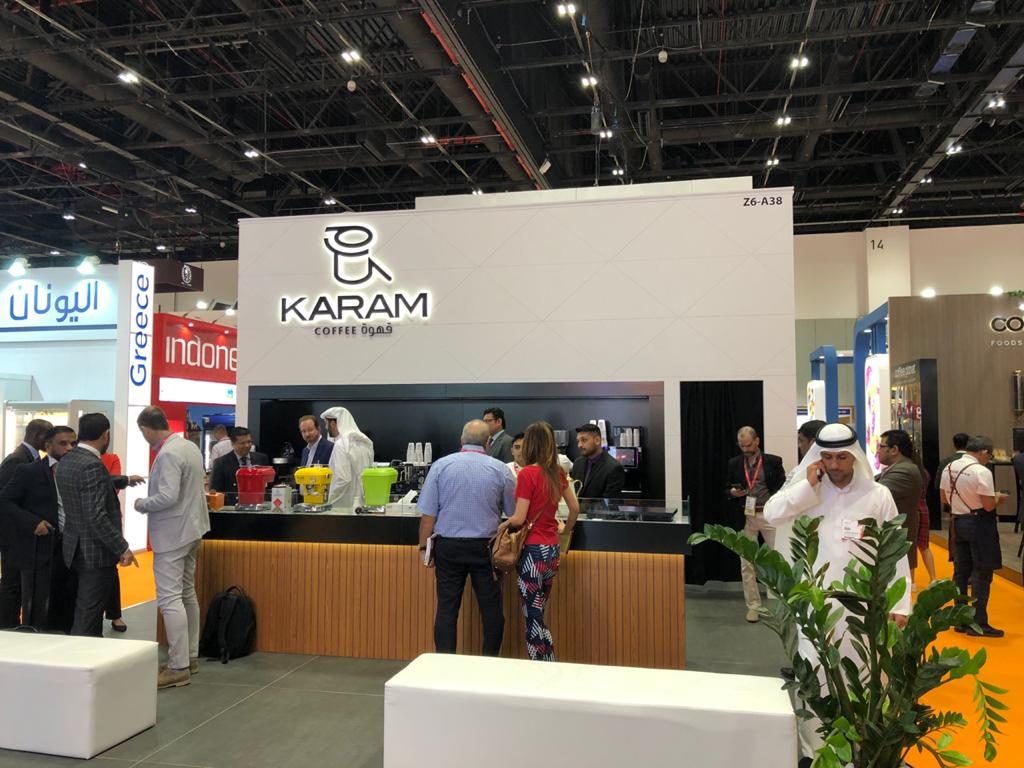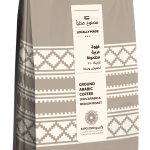Dubai – Emirati company Karam Coffee is a licensed coffee brand in Expo 2020, a multi-sectorial world exhibition to run for six months starting in October in Dubai, United Arab Emirates. The company has a stand (pictured above) in the beverage pavilion of Gulfood, a food trade show that runs in Dubai, and talked to ANBA about the Expo collectable products, the types of coffee and their history.
Expo 2020 licensed products use the exhibition brand and are the show’s souvenirs. For Expo 2020, Karam Coffee is selling Arabic and Turkish coffee, both medium roasted, in exclusive 250-grams packets. “The medium roast is more pleasing to Emirati buyers’ tastes,” said Mughis Ahmed, marketing manager at Essa Al-Ghurair Insvestment LLC group, which runs the company. He explained that Karam Food Industries, which owns the Karam Coffee brand, is doing the roasting and packing for Expo 2020, and that the product was ordered under licensing from the exhibition. “The package design, the colors, the font, everything was decided on by the Expo. Our logo only shows on the back of the package,” he said.
The 250-grams packet’ price for the final consumer is AED 22 for the Turkish coffee and AED 25 for the Arabic coffee – around USD 6 and USD 7, respectively. Al-Ghurair group is known for having the UAE’s first wheat flour mill – the National Flour Mill.
Karam Coffee was founded in 2013 and sells both coffee beans and ground coffee of Arab, Turkish, Arab with cardamom, Italian espresso, Yemeni and other varieties. The company is entirely Emirati and has one of the highest coffee roasting capacities in the region. “We can roast around 16-20 tons of coffee a day,” Ahmed said.
(Story continues after photo gallery)
The Yemeni coffee comes from a mountain region called Haraz. “In addition to the war factor, which complicates the logistics, they have a small output, and coffee growers can’t promise they’ll have a production next year, so we have this limited edition of this origin coffee, which we bought a limited amount of,” the manager said. A 250-gram packet costs AED 125 (USD 34).
Ahmed says that coffee is much like wine, as the harvest, weather, cultivation and blend must be balanced. “So, it’s not all written on stone. We must continuously innovate and adapt to the market,” he said.
The company doesn’t work with Brazilian beans because of logistics, cost and time, Ahmed says. Its green coffee come from Kenya, Uganda and Ethiopia in Africa and two Asian countries. The company buys the green coffee and does the roasting, blending and packaging in Dubai.
In 2016, an Expo 2020 representation approached Karam Coffee to be the event’s official coffee supplier. For six months, the company has sold the coffee online on both Karam and Expo 2020 website. “We won’t have espresso and we’re still negotiating if we’ll offer it during the event,” Ahmed said.
Expo 2020 licensed products are limited and could finish by the end of the event in April 2021. Ahmed said that there’s no prospection about the licensed products production and sales, as the event is a first in the country. Karam is selling the product on demand. “We don’t know how to predict, since forecasts rely on historic figures, and this is an unprecedent event here,” the executive said. He preferred not to report which are the prices to be an Expo licensee but said that there are fixed royalties and percentages.
The manager said that Expo 2020 Dubai is concerned in supporting UAE companies and requested only the Arabic and Turkish coffees as they best represent the country’s flavors. The coffee is one of Expo collectables but doesn’t have exclusive rights to the event, which will feature pavilions and companies from around the globe.
Other collectables include a camel milk soap by The Camel Soap Factory, which received ANBA in his factory in Dubai last week. The story will be published soon.
Translated by Guilherme Miranda







